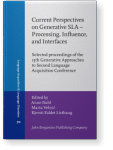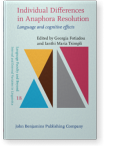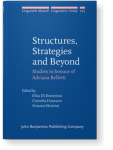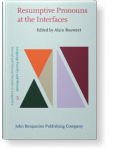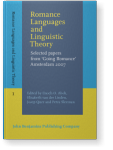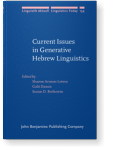Naama Friedmann
List of John Benjamins publications for which Naama Friedmann plays a role.
Book series
2015 Relatively easy relatives: Children with syntactic SLI avoid intervention Structures, Strategies and Beyond: Studies in honour of Adriana Belletti, Di Domenico, Elisa, Cornelia Hamann and Simona Matteini (eds.), pp. 303–320 | Article
We tested whether the relativized relatives approach, which suggests that typically-developing children encounter difficulties with movement structures in which one lexically-restricted NP intervenes in the movement of another lexically-restricted NP, also applies to syntactic SLI (SySLI). We… read more
2011 Last resort and no resort: Resumptive pronouns in Hebrew and Palestinian Arabic hearing impairment Resumptive Pronouns at the Interfaces, Rouveret, Alain (ed.), pp. 223–240 | Article
Whereas both Hebrew and Palestinian Arabic use resumption in object relatives, children with hearing impairment show completely different patterns of comprehension and production of object relatives in the two languages. This research compared the performance in the two languages, connecting the… read more
2009 Hebrew and Arabic children going Romance: On the acquisition of word order in Semitic and Romance Romance Languages and Linguistic Theory: Selected papers from ‘Going Romance’ Amsterdam 2007, Aboh, Enoch O., Elisabeth van der Linden, Josep Quer and Petra Sleeman (eds.), pp. 51–66 | Article
In Hebrew, European-Portuguese, Spanish, and Palestinian-Arabic both SV and VS orders are possible. In the early stages of sentence construction, however, children acquiring these languages do not use the whole array of word orders in their language. Their word order preference differs in the… read more
2008 Resumptive pronouns as a last resort when movement is impaired: Relative clauses in hearing impairment Current Issues in Generative Hebrew Linguistics, Armon-Lotem, Sharon, Gabi Danon and Susan Rothstein (eds.), pp. 267–290 | Article
This study tested 14 school-age orally-trained children with hearing impairment who have a deficit in A-bar movement, manifested in an impaired comprehension of object relatives and topicalization structures. When they produce a grammatical object relative clause, they typically produce it with a… read more
